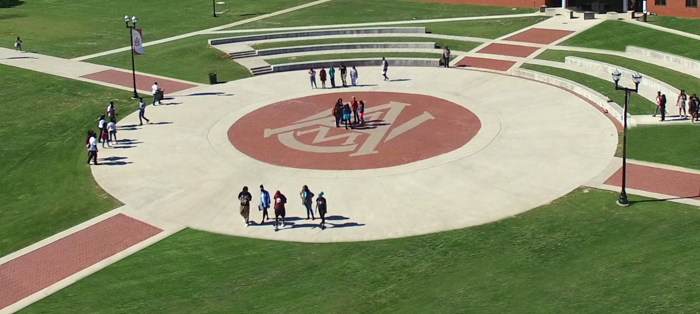Center for Excellence in Forestry
Introduction and background
The USDA Forest Service Center of Excellence in Forestry (COE) at Alabama A&M University (AAMU) was established in 1993. The then Chief Dale Robertson of the US Forest Service (USFS) and the Deputy Secretary of Agriculture signed a proclamation at AAMU to train young people, many of whom African Americans, for careers in the USFS. Accomplishments of the COE include recruitment and retention of students, hiring dedicated faculty members, curriculum development, collaborative research in upland hardwood silviculture, agroforestry, and wildlife, outreach to underserved forest landowners, and expanding the AAMU library collection in forestry and wildlife sciences.
The USFS Multicultural Workforce Strategic Initiatives (MWSI) program at AMMU was one of the largest student recruitment initiatives for African Americans. Approximately 25 undergraduate students received financial support and training annually. As a result of MSWI, AAMU trained natural resource professionals (foresters, biological, environmental, and soil scientists) and administrative specialists (accounting, human resources, and computer specialists with minor in forestry) that honored their service agreements to work for the USFS after graduation. Over 60% of the African American foresters employed by the USFS are AAMU graduates.
In 2002, the Society of American Foresters (SAF) granted professional accreditation to the AAMU forestry curricula in Forest Management and Forest Science, the first and only HBCU to merit this distinction. The Forest Service’s contribution was pivotal in attaining this accreditation. Two years later, AAMU faculty received a major grant from the National Science Foundation to establish the Center for Forest Ecosystem Assessment (CFEA). Research work funded by CFEA involved the AAMU faculty in the Forestry, Ecology and Wildlife Program (FEWP) and the USFS researchers in examining a wide array of ecological impacts of managing the upland hardwood forests of the nearby Bankhead National Forest to achieve the desired future condition for these stands. In the same year, FEWP moved to a new building, the Agricultural Research Center, a substantial commitment of resources from the State of Alabama and AAMU to FEWP and the COE partnership.
The USFS employees based on the AAMU campus have partnered with FEWP faculty and staff on research projects focused on the ecology and management of upland hardwoods, including silviculture, agroforestry, wildlife, entomology, and genetics. In 2005, the Southern Research Station moved the then Director of the USDA National Agroforestry Center onto the AAMU campus to collaborate with faculty in leading agroforestry research and outreach throughout the South. AAMU also provided leadership for the 1890 Agroforestry Consortium that coordinates agroforestry efforts among the 1890 institutions.
FEWP started receiving McIntire-Stennis funds in 2009, thus enhancing the scope of its research capacity that supports our land grant mission and stakeholders’ needs. McIntire-Stennis Forestry Research Program is matched 1:1 by the State of Alabama. In 2020, we had six active research projects focusing on forest restoration, forest recreation, native grasses, herpetofauna, bats, and ecological patterns. These projects have leveraged additional federal, state, and private funding related to forest research, management, and outreach efforts.
The USFS, Alabama Forestry Commission, and NRCS support FireDawgs, our students’ wild firefighter team. FireDawgs was established in 2009 to train students to fight wildfires, manage controlled burns and educate the public on fire prevention. In 2014, the USDA Forest Service Fire and Aviation Management began to fund workforce outreach and development projects such as the Forestry Apprenticeship Program, HBCU Fire Consortium, and the Forestry Fair. In 2015, the FireDawgs signed a formal 5-year agreement with the Alabama State Parks to implement prescribed burning on state lands. These programs have contributed to planting seeds of awareness for youth about working for the great outdoors and have developed the largest candidate pool of African American foresters and wildland firefighters. These diverse candidates are linked with employment opportunities of the USFS and other federal/state agencies and private industries and graduate studies in other universities.
Since its inception, COE has actively sought partnerships and linkages with other federal and state agencies and private industries interested in diversifying their workforce. Some linkages may be finite in scope and duration; however, such cumulative efforts broaden the scope of the COE. Partners include the Alabama Forestry Commission, International Paper, Weyerhaeuser, and the Bureau of Land Management. Capacity enhancement of the forestry, ecology, and wildlife curriculum at AAMU has contributed significantly to diversifying the forest industry workforce.
THE PRESENT AND THE FUTURE
In 2020, the Forest Service, concluding that FEWP has achieved the desired capacity, redirected the support to AAMU from a yearly grant toward cooperative agreements for research and outreach. COE is now poised to capitalize on the capacity it has already built and enable faculty to continue strengthening teaching, research, and outreach efforts and facilitating the recruitment of quality undergraduate and graduate students. The USFS research scientists and National Forests in Alabama directly contribute to the success of this important partnership.
Forestry majors are now graduating from AAMU with a fully SAF accredited baccalaureate degree in forestry, allowing them to be hired by federal agencies, state agencies, forest industries, and private consultant firms. Faculty members are increasingly successful in competing for research grants, and the number of graduate students in the forestry program has increased significantly over the past years. Several faculty members are accelerating their outreach/extension efforts in forestry and agroforestry to underserved landowners in Alabama and throughout the Southeast.
COE is playing and will continue to play a critical role in diversifying the workforce of the USFS and other governmental and private entities. AAMU and USFS strive to expand their partnership to include more governmental and industry partners. If your organization wants to partner with us, please contact Dr. Kozma Naka at 256?372-4235 or kozma.naka@aamu.edu

 Skip to content
Skip to content